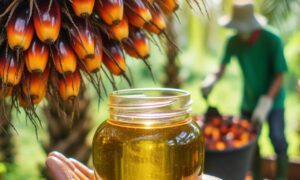Palm erases early gains; speculative buying, short covering caps losses

Malaysian palm oil futures closed lower on Monday, with the December contract falling by 36 ringgit to 4,314 ringgit per metric ton, driven by weaker crude oil prices. Speculative buying and short covering limited losses, but growing Indonesian production is expected to cap future gains. India’s palm oil imports in September dropped by over 33% due to high prices, and soyoil prices also declined, following expectations of a record U.S. soybean harvest. Palm oil often tracks movements in rival edible oils in the global market.
KUALA LUMPUR: Malaysian palm oil futures reversed early gains to close lower on Monday, as the contract tracked weaker crude oil prices, but a combination of speculative buying and short covering limited the losses.
The benchmark palm oil contract for December delivery on the Bursa Malaysia Derivatives Exchange fell 36 ringgit, or 0.83%, to 4,314 ringgit ($1,005.36) a metric ton at the close.
The contract had earlier gained 0.51% during the midday break.
There is a combination of speculative buying and short covering in the market today, said Paramalingam Supramaniam, director at Selangor-based brokerage Pelindung Bestari.
“Though we are seeing the lower estimates for Malaysian production, Indonesian production are rocketing ahead with a double digit growth. This could cap gains once the speculative buying wanes off,” he said.
Dalian’s most-active soyoil contract fell 0.63%, while its palm oil contract climbed 0.32%.
However, soyoil prices on the Chicago Board of Trade were down 1.59%, following a drop in the CBOT soybeans contract on expectations of a record U.S harvest.
Palm oil tracks price movements of rival edible oils, as they compete for a share of the global vegetable oils market.
The ringgit, palm’s currency of trade, weakened 0.16% against the dollar.
Oil prices on Monday wiped out all of last week’s gains as China’s stimulus plans failed to inspire confidence among investors, while the market remained on edge about potential Israeli attacks on Iranian oil infrastructure.
Weaker crude oil futures make palm a less attractive option for biodiesel feedstock.
India’s palm oil imports in September fell by nearly a third from a month ago because of higher prices, hitting a six-month low, while sunflower oil imports plunged to a ten-month low, the Solvent Extractors’ Association of India said on Friday.
Source Link : https://www.brecorder.com/news/40327032

















